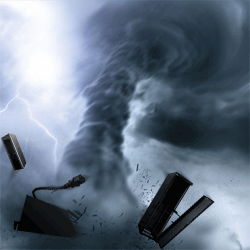Five Tips for Businesses to Avoid Downtime
 Salt Lake City companies never expected a tornado to take their business offline but that’s exactly what would have happened to XMission if we hadn’t properly prepared for the worst.
Salt Lake City companies never expected a tornado to take their business offline but that’s exactly what would have happened to XMission if we hadn’t properly prepared for the worst.
Back in 1999, we decided to expand into the empty former battery factory next door and convert it into a modern data center. The Internet bubble was in full effect and we had outgrown the generator we had installed some years earlier. We were purchasing a much larger generator for the new data center but were many months away from completing that project. For the interim, our only option was to rent a generator on a trailer and park it in the alley behind my office (where Steven Segall recently filmed an epic fight scene, based on the ferocious grunts I could hear from my office).
At the time, it might have seemed a bit paranoid. We had two UPS systems with batteries which would help us weather most electrical outages, since they were rare and typically only lasted seconds. Salt Lake City is also located in a region with among the fewest natural disasters. We decided to err on the side of caution even though I never expected a tornado would sweep through the middle of town and take down our otherwise very reliable power for hours. Nonetheless, on August 11, 1999 that’s exactly what happened and XMission services remained running, which greatly pleased and impressed our customers.
Undoubtedly, disaster assessment and planning can rank among our least fulfilling job responsibilities. Preparing for something bad can seem pessimistic, abstract, and unproductive. Unless your business regularly experiences downtime, resources spent to prepare for it can feel wasteful. Of course, when your business inevitably experiences an outage the preparation proves its worth and might even save the company.
Here are 5 quick tips to help keep your company online.
1. Business class Primary Internet Connection
If your company requires reliable Internet connectivity and you lose money for every minute your connection is down don’t make the “money saving” mistake of picking a cheap connection and think that it is comparable to a high quality enterprise one. A fiber or metro ethernet connection provides greater reliability because it is better engineered and managed.
2. Backup Connection
Even if you have a premium level Internet connection, maintain a backup connection through another provider and setup your network to fail over to it if needed. Depending on the size of your enterprise and how critical your needs might be, this can often be a cheap wireless, DSL or cable connection since it will rarely be needed. When it is, having redundant connectivity can make the difference between closing or losing a big sale.
3. Backup Power (UPS and maybe a Generator)
I strongly encourage companies to put all of their workstations and servers on UPS (Uninterruptible Power Supply) to protect against power surges, brownouts and short power outages. While a UPS can only provide a short uptime due to the limited battery power, keeping your computer up during brief power outages can help you avoid losing an important document you’re working on and might even save you from data corruption. Larger companies can likely justify having one or more generators on site so their staff can keep working even during an extended power outage. In many cases though this is only necessary if you’re located somewhere with an unreliable electrical infrastructure.
4. Robust Equipment (Networking and Computing Gear) and Staff/Vendor
Choose business class equipment for your network and computing needs because you need it to perform better than consumer class gear. Of course it will cost more but that’s because fewer corners are cut to meet lower priced expectations for residential users. As well, your networking and computing infrastructure needs to be architected and deployed competently to ensure reliability, which means you need to have a talented IT staff or vendor to ensure everything is done right.
5. Off Site Presence
Are you currently hosting your web site or other systems-critical data at an office location? Unless you have a good UPS and backup generator I strongly advise against hosting your online presence from your offices and instead host it in a data center via colocation or cloud hosting. Data centers are designed to provide an ideal and stable environment for systems critical networked servers. With N+1 redundancy and a sophisticated infrastructure meant to absolutely, always stay up, data centers are hands down the most reliable solution for business critical sites like your company’s home page. Also store offsite backups in a data center, just in case.
Conclusion
While company needs and priorities vary, carefully assess your online strategy and how to best accomplish it successfully. Planning and preparing for outages seems tedious and unnecessary until that fateful day when you become a hero or not, depending on how well you implemented your business continuity plan.
Need help? Contact XMission to find out how which of our products and services can help you complete your online strategy so you can succeed and sleep at night. Who knows? Maybe we can even help you be a hero when an unexpected disaster blows through your town.
Grant Sperry works at XMission overseeing operations and colocation. Established back in 1993, XMission was an early Internet pioneer and continues to provide amazing products and personalized service. If you like what we’re doing, contact us to see how we can help your company thrive.
Art Lives Here: XMission proudly sponsors the 2015 Utah Arts Festival The Rules of Local Number Portability
Comments are currently closed.